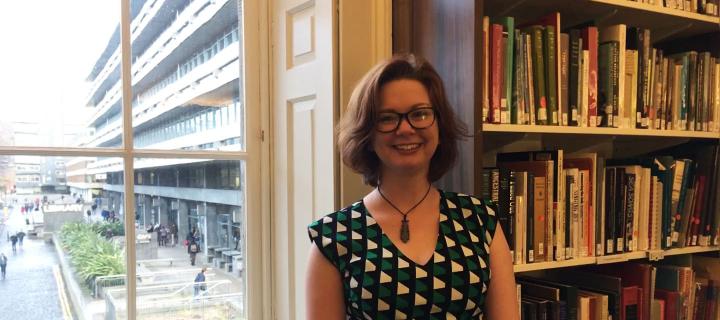St Andrew’s Day marks official reopening of the School of Scottish Studies Archives
Scottish Ethnology students, past and present, reflect on what the Archives mean to them.

St Andrew’s Day holds an extra special significance for us this year, as the School of Scottish Studies Archives officially reopen after major refurbishment.
Ahead of the University of Edinburgh’s annual celebration of Scottish music and song, during which staff and students from Celtic and Scottish Studies will perform, the Archives will host a reception to mark the reopening of our extensive collection of recordings about Scotland and its people.
The core of the Archives is the ethnological fieldwork undertaken by staff and students over the past sixty years, including a sound archive comprising some 33,000 recordings, a photographic archive containing thousands of images from the 1930s onwards, a small film and video collection, and a manuscript archive.
To contextualise the fieldwork material, the Archives also contain the Scottish Studies library of ethnological publications, both Scottish and international.
A main draw for studying Scottish Ethnology in Edinburgh
The Archives are a living resource; an inspiring, creative hub for the many musicians, singers, storytellers, and writers who study or work at the University, particularly in Celtic and Scottish Studies at the School of Literatures, Languages and Cultures (LLC).
Rosemary Hall, who is currently completing an MSc by Research in Scottish Ethnology at LLC, and who will be playing the fiddle at the St Andrew’s Day concert, cites the resource as “one of the main draws for me in coming to study here (from Maryland, USA).”
“The collections of fieldwork recordings are so unique, and contain so much information that can contribute to all kinds of research. These recordings are going to be very useful to me in my research.”
“I am also very excited to be able to contribute my own field recordings to the archive. I think it is so important that it is still actively collecting, and helps students learn to do their own collecting. Everyone at the Archives is so helpful with this, and with using all of their material, and the fact that they’re based in George Square makes this research and participation much more accessible.”
A unique postgraduate programme
Rosemary has been playing Scottish fiddle music since a young age, and interested in studying the music, academically, for years.
With its unique collections and breadth of staff expertise, then, Edinburgh was the perfect location to pursue this interest.
“The research of staff members in Celtic and Scottish Studies drew my attention because I knew they would be great mentors and are experts in their field.”
“Since I have been here, the programme has exceeded my expectations! My supervisors are incredibly supportive and helpful, the Archives have been an invaluable resource, and I feel that I am a part of this field and am contributing to future research.”
A rich resource of folk material

Like Rosemary, recent graduate, Ella Leith, knew she wanted to study Scottish Ethnology for many years, and she has since completed three degrees with us: an MA (Hons); an MSc by Research, and a PhD on British Sign Language storytelling in Scottish deaf communities.
Originally from the West Midlands, she describes the School of Scottish Studies Archives as a “huge draw”, saying “having such a rich resource of folk material at my fingertips - while also being encouraged from the very beginning to submit my own fieldwork to it - was too great an opportunity to miss.”
In terms of Ella’s learning experience in Celtic and Scottish Studies, “being encouraged to undertake independent fieldwork from very early on in the undergraduate programme had a massive impact. The sense of being thought capable of making a valuable contribution to the Archive, even as a lowly second year, was very empowering.”
“I also valued the freedom we were given to explore the Archives, and to come up with our own essay topics and projects. It gave me a real excitement about the subject area and all the possibilities for research - which I then went on to explore in my postgraduate study.”
Explore the archives
The School of Scottish Studies Archives are located at 29 George Square, Edinburgh. The Search Room is open 10:00-16:00, Tuesday to Friday. No appointment is necessary but, if you wish to discuss your requirements in advance, email Scottish.Studies.Archives@ed.ac.uk or telephone 0131 650 3060.
Find out more
Are you interested in studying Scottish Ethnology at LLC?
The only programme of its kind in the world, our four-year undergraduate degree provides a fascinating insight into the traditional and popular culture of Scotland, putting folklore and folklife in a Scottish and international context. We also offer a one year MSc by Research degree and a PhD in the area.
Find out more in our guide to Celtic and Scottish Studies
Related links
Read our full interview with Ella Leith
Find out more about the annual St Andrew's Day concert at the University

